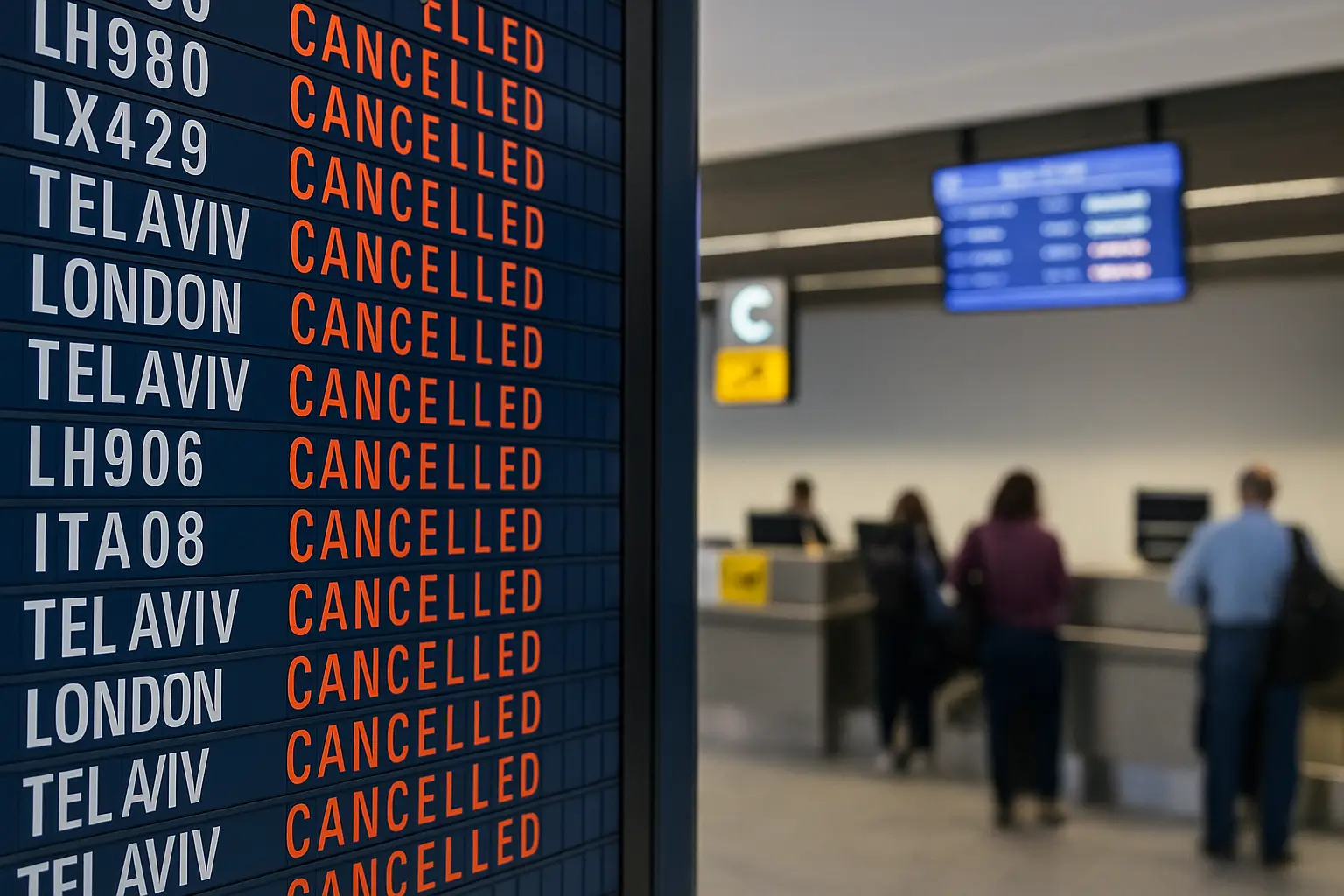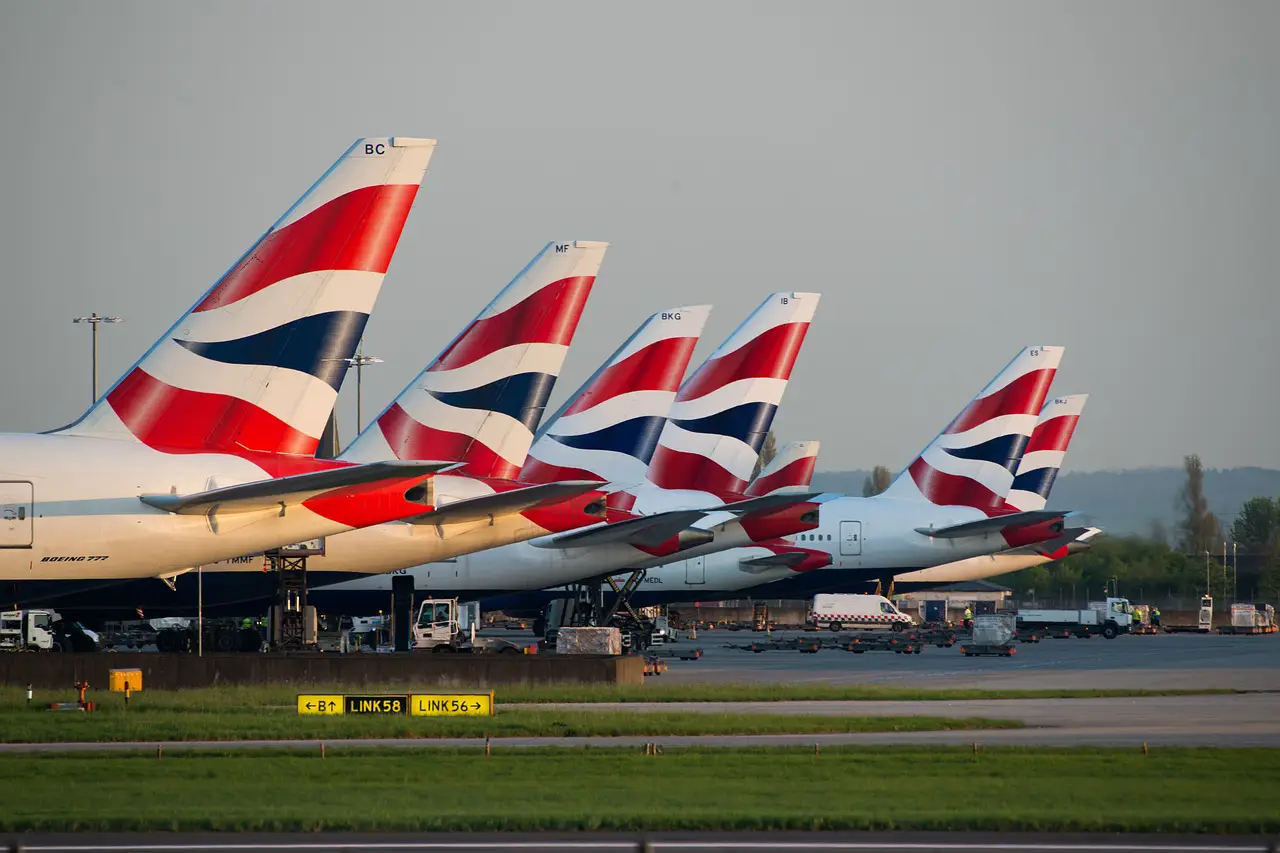Swiss, British Airways, Austrian, Brussels, Ryanair, Wizz Air, Iberia and Mostly all International Airlines Suspending Their Flight to Isreal as War Like Situation Creates Fresh Travel Alert, What You Need To Know - Travel And Tour World
Sunday, May 11, 2025

Swiss, British Airways, Austrian, Brussels, Ryanair, Wizz Air, Iberia, and almost all international airlines are suspending their flight to Israel as a war-like situation creates a fresh travel alert. Swiss, British Airways, Austrian, Brussels, Ryanair, Wizz Air, Iberia, and nearly all other international airlines are rapidly pulling back their flight operations to Israel. Meanwhile, Swiss, British Airways, Austrian, Brussels, Ryanair, Wizz Air, Iberia, and most international airlines are updating passengers with fresh travel alerts amid escalating conflict.
This widespread suspension of flights to Israel by Swiss, British Airways, Austrian, Brussels, Ryanair, Wizz Air, Iberia, and their global peers is a direct response to the rapidly evolving war-like situation. Moreover, Swiss, British Airways, Austrian, Brussels, Ryanair, Wizz Air, Iberia, and all international airlines now face pressure as fresh travel alerts heighten global aviation concerns. As Swiss, British Airways, Austrian, Brussels, Ryanair, Wizz Air, and Iberia halt operations, global travelers must urgently reassess plans.
International airline operations from Swiss International Air Lines, British Airways, Austrian Airlines, Brussels Airlines, Ryanair, Wizz Air, Iberia, Air France, Lufthansa, LOT Polish Airlines, Air Europa, Air India, Delta Air Lines, United Airlines, Emirates, flydubai, JetBlue Airways, Ethiopian Airlines, Air Seychelles, El Al Israel Airlines, Arkia, Israir Airlines, Turkish Airlines, KLM Royal Dutch Airlines, Qatar Airways, Singapore Airlines, Saudia, Etihad Airways, Thai Airways, Malaysia Airlines, Japan Airlines, Korean Air, Finnair, China Eastern Airlines, China Southern Airlines, Virgin Atlantic in Israel are collapsing into unprecedented disarray. Tel Aviv’s Ben Gurion Airport, once a bustling regional hub, is now a shadow of its former self. Following a direct missile strike on airport grounds by Yemen’s Houthi rebels, nearly every major international carrier has suspended flights to Israel—again. The global aviation community is turning its back on the region for the second time in under a year.
| Swiss International Air Lines | British Airways | Austrian Airlines |
| Brussels Airlines | Ryanair | Wizz Air |
| Iberia | Air France | Lufthansa |
| LOT Polish Airlines | Air Europa | Air India |
| Delta Air Lines | United Airlines | Emirates |
| flydubai | JetBlue Airways | Ethiopian Airlines |
| Air Seychelles | El Al Israel Airlines | Arkia |
| Israir Airlines | Turkish Airlines | KLM Royal Dutch Airlines |
| Qatar Airways | Singapore Airlines | Saudia |
| Etihad Airways | Thai Airways | Malaysia Airlines |
| Japan Airlines | Korean Air | Finnair |
| China Eastern Airlines | China Southern Airlines | Virgin Atlantic |
This travel chaos has triggered ripple effects that are paralyzing thousands of passengers. Israeli citizens are stranded across Europe, the U.S., and beyond, desperately scrambling to find a way home. Airlines are either pushing back return dates or outright halting routes indefinitely, citing safety risks and geopolitical instability.
The immediate result? Skyrocketing prices, overloaded alternate hubs, and extreme stress for travelers trying to reroute via secondary cities like Athens, Larnaca, or Rome. Israel’s aviation and tourism sectors are once again plunged into crisis mode—and this time, the damage may last longer.
British Airways extended its Tel Aviv suspension through June 14, signaling a longer-term withdrawal. Lufthansa Group carriers—SWISS, Austrian, and Brussels Airlines—will remain absent through May 11. Delta Air Lines has grounded its Tel Aviv–New York service until at least May 19, while United Airlines has paused operations through May 18.
Even low-cost carriers are retreating. Ryanair, Wizz Air, and Air Europa have suspended service through mid-May. Air India, Iberia, and Air France have followed suit. Only a trickle of international flights remain: Emirates, flydubai, and JetBlue are among the rare operators still maintaining limited service. Ethiopian Airlines has cautiously resumed some routes but remains alert to fresh disruptions.
This dramatic exodus of foreign airlines reflects a critical loss of confidence in Israel’s airspace. After only recently restoring services post-Gaza conflict, airlines are now demonstrating deep reluctance to risk crew, passengers, or aircraft in a warzone-adjacent corridor.
The effects on passenger volumes are staggering. Ben Gurion Airport handled an average of 70,000 travelers daily just two weeks ago. That number has now plummeted to 40,000 and continues to drop. Hotel bookings are being canceled. Tour groups are postponing or rerouting to destinations deemed safer. Israel’s vital inbound tourism market—already weakened by years of instability—is facing yet another blow.
For outbound Israeli travelers, the situation is even more dire. Those vacationing or working abroad are unable to return due to nonstop cancellations. With few direct flights left and massive demand for limited seats, fares have exploded.
Israel’s national carrier El Al has moved swiftly. Within 48 hours of the flight suspensions, the airline began selling capped-price one-way tickets from Larnaca ($99) and Athens ($149) to Tel Aviv. Additionally, it has introduced a maximum fare policy for flights from major cities like New York, Rome, Paris, and Barcelona.
Smaller airlines Arkia and Israir are also flying rescue missions—dispatching planes to neighboring countries to collect stranded citizens. However, seats are limited, and demand far outweighs supply. With ticket websites crashing and fares selling out in minutes, travelers are panicking.
This rapid, localized response highlights a deeper truth: in the absence of foreign support, Israel’s aviation resilience now depends on its domestic operators.
The tourism industry is buckling. International tour operators are halting Israel-bound packages. Business travelers are canceling appointments. Travel advisories from multiple countries have intensified the sense of danger.
Cruise ships are modifying Mediterranean itineraries to avoid Israeli ports. Hotel chains are reporting mass cancellations. Major tourism attractions—from Jerusalem’s Old City to Eilat’s resorts—are seeing sharp drops in visitors.
Moreover, regional neighbors like Jordan, Egypt, and Cyprus are quietly positioning themselves as safer alternatives for Middle Eastern exploration. This redirection could reroute millions of dollars in tourism revenue away from Israel for the remainder of 2025.
As chaos unfolds, regional hubs are under intense strain. Athens, Larnaca, and Amman are absorbing diverted traffic, becoming temporary lifelines for Israeli air connectivity. However, these airports were not designed to handle the sudden surge. Delays are piling up, layovers are lengthening, and airport hotels are running at full occupancy.
Travelers report long queues, limited availability, and overbooked connecting flights. The cascading effect is being felt across Europe’s air traffic network, as Israeli passengers reroute via Frankfurt, Vienna, Istanbul, and Milan.
For global carriers, the disruption exposes financial and operational vulnerabilities. Just weeks ago, many were bullish on restarting Israel operations, betting on renewed stability and lucrative transatlantic connections. Now, with fresh geopolitical violence, the risk has eclipsed reward.
The strategic reassessment underway is significant. Airlines are reviewing route viability, insurance implications, and regional risk exposure. In the process, confidence in Tel Aviv as a regional aviation hub has eroded.
This could have far-reaching consequences for Israel’s integration into global aviation networks, especially if future conflicts continue to erupt unpredictably.
Looking ahead, this episode will likely reshape airline and tourism policy. International carriers may impose stricter conditions for service restoration, including extended risk assessments and airspace surveillance. Insurers are expected to hike premiums for flights operating in or near Israeli airspace.
Governments may also revise travel advisories more frequently, forcing travelers to navigate last-minute changes. Tourists will demand more robust cancellation protections and flexible booking policies.
Travel tech platforms, airlines, and governments must now collaborate on real-time communication tools, emergency ticketing systems, and integrated crisis response protocols. Without such measures, global trust in travel safety could falter further.
This isn’t just an aviation story. It’s a human story. Thousands of families separated. Workers stranded. Students delayed. Weddings missed. Business deals canceled.
The closure of Israel’s skies once again serves as a painful reminder of how travel—often taken for granted—can be derailed in an instant. Rebuilding confidence will take time, transparency, and tangible safety reassurances.
Until then, Israel’s aviation sector remains on pause. The world is watching. And travelers everywhere are asking: when will the skies reopen safely?
Tags: Air Europa, Air France, air india, Air Seychelles, ARKIA, Austrian Airlines, british airways, Brussels Airlines, china eastern airlines, china southern airlines, delta air lines, El Al Israel Airlines, Emirates, ethiopian airlines, Etihad Airways, finnair, flydubai, iberia, Israir Airlines, japan airlines, JetBlue Airways, klm royal dutch airlines, korean air, lot polish airlines, lufthansa, malaysia airlines, Qatar Airways, Ryanair, Saudia, Singapore Airlines, Swiss International Air Lines, Thai Airways, Turkish Airlines, United Airlines, Virgin Atlantic, Wizz Air











